Audit and Assurance Report: Objectivity, Independence, and Threats
VerifiedAdded on 2022/08/25
|10
|2873
|15
Report
AI Summary
This report delves into the critical importance of auditor objectivity and independence within the context of audit and assurance. It defines these concepts and emphasizes their significance in maintaining the credibility of financial reports. The report then analyzes five specific scenarios, identifying potential threats such as self-interest, familiarity, and self-review, and discusses their potential consequences on audit outcomes and conduct. Furthermore, the report provides recommendations for mitigating these threats, including mandatory staff rotation, enhanced training, and the implementation of robust control systems. The conclusion reinforces the need for safeguards to protect the objectivity of auditors and ensure the integrity of the audit process.
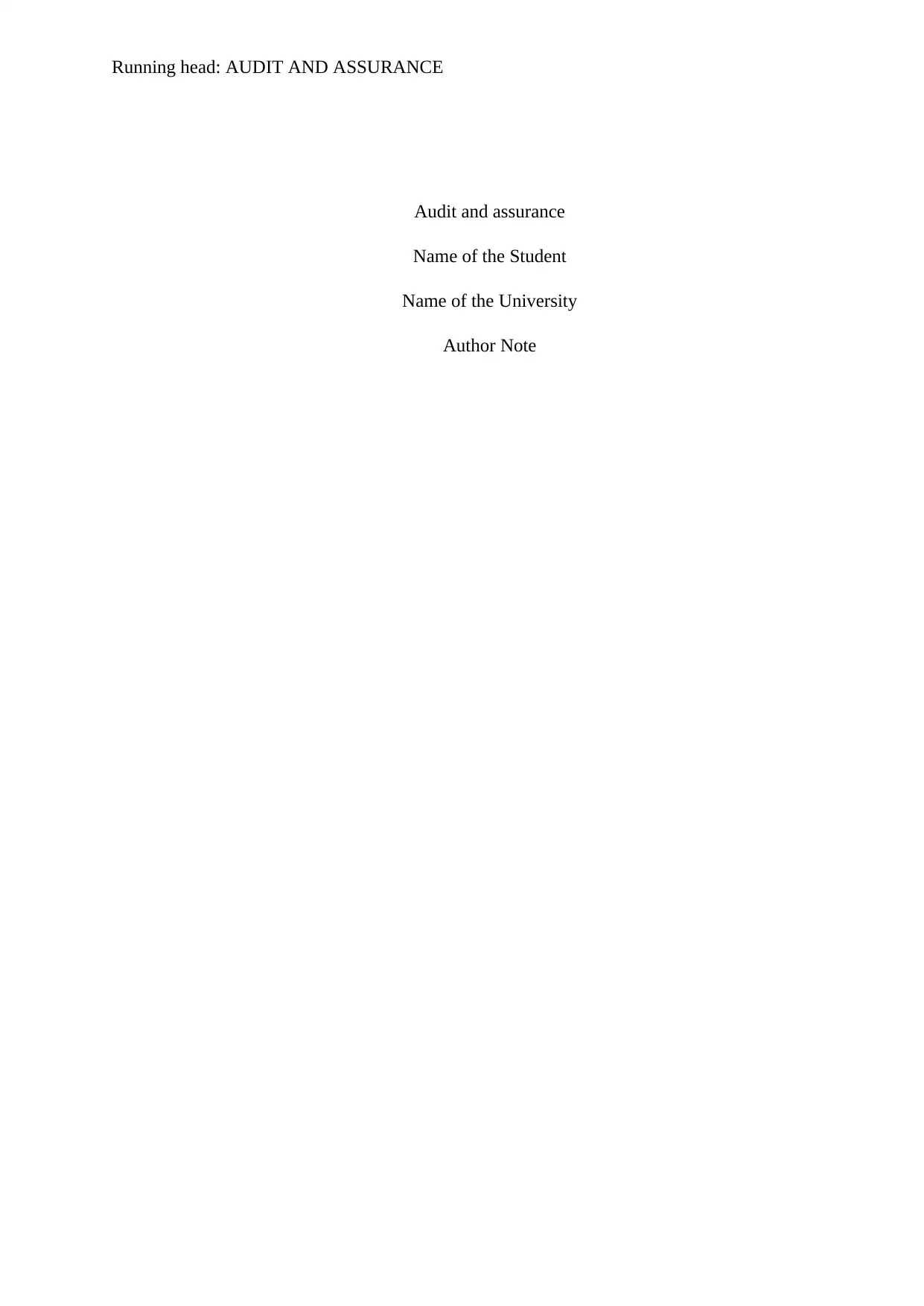
Running head: AUDIT AND ASSURANCE
Audit and assurance
Name of the Student
Name of the University
Author Note
Audit and assurance
Name of the Student
Name of the University
Author Note
Paraphrase This Document
Need a fresh take? Get an instant paraphrase of this document with our AI Paraphraser
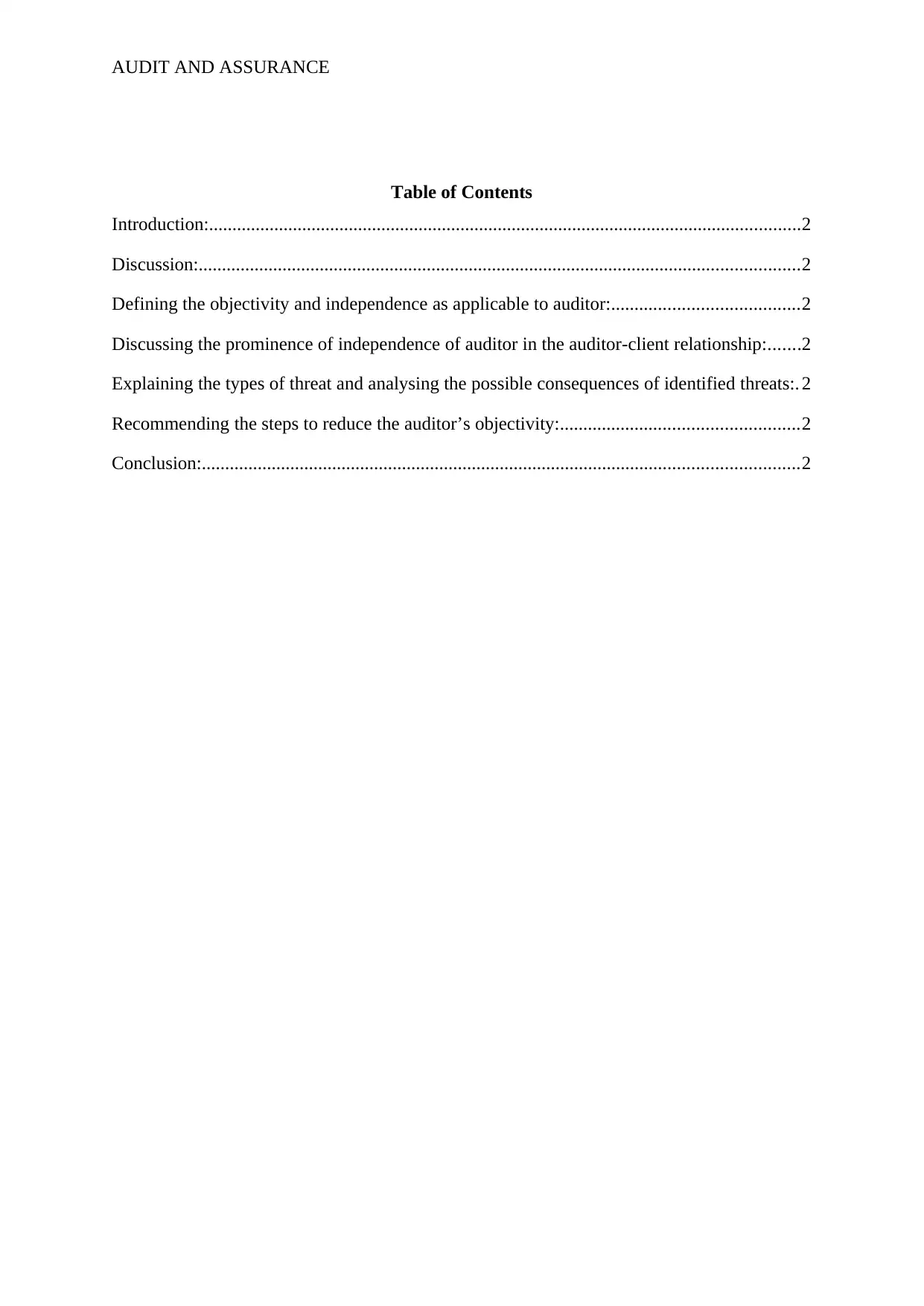
AUDIT AND ASSURANCE
Table of Contents
Introduction:...............................................................................................................................2
Discussion:.................................................................................................................................2
Defining the objectivity and independence as applicable to auditor:........................................2
Discussing the prominence of independence of auditor in the auditor-client relationship:.......2
Explaining the types of threat and analysing the possible consequences of identified threats:. 2
Recommending the steps to reduce the auditor’s objectivity:...................................................2
Conclusion:................................................................................................................................2
Table of Contents
Introduction:...............................................................................................................................2
Discussion:.................................................................................................................................2
Defining the objectivity and independence as applicable to auditor:........................................2
Discussing the prominence of independence of auditor in the auditor-client relationship:.......2
Explaining the types of threat and analysing the possible consequences of identified threats:. 2
Recommending the steps to reduce the auditor’s objectivity:...................................................2
Conclusion:................................................................................................................................2
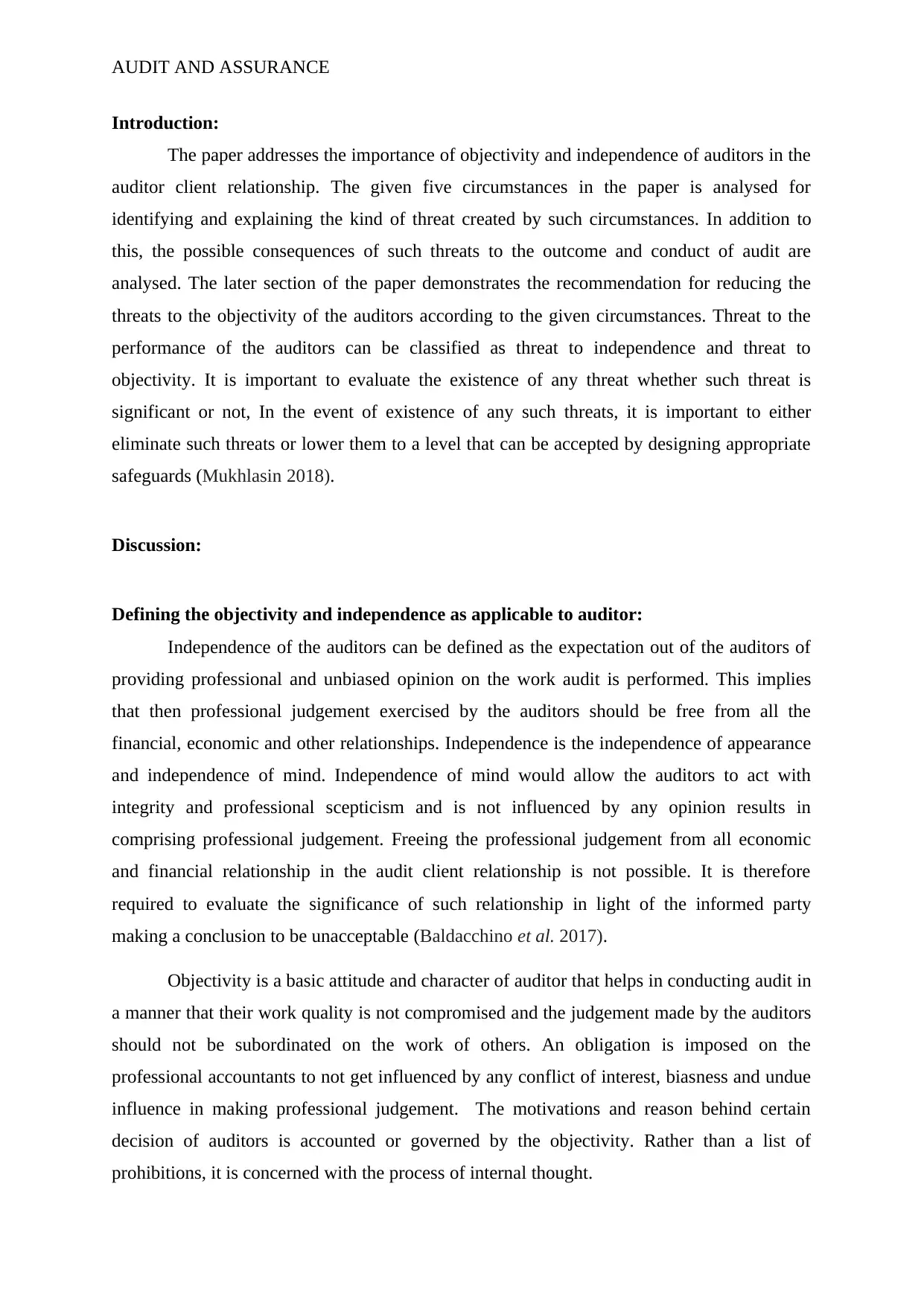
AUDIT AND ASSURANCE
Introduction:
The paper addresses the importance of objectivity and independence of auditors in the
auditor client relationship. The given five circumstances in the paper is analysed for
identifying and explaining the kind of threat created by such circumstances. In addition to
this, the possible consequences of such threats to the outcome and conduct of audit are
analysed. The later section of the paper demonstrates the recommendation for reducing the
threats to the objectivity of the auditors according to the given circumstances. Threat to the
performance of the auditors can be classified as threat to independence and threat to
objectivity. It is important to evaluate the existence of any threat whether such threat is
significant or not, In the event of existence of any such threats, it is important to either
eliminate such threats or lower them to a level that can be accepted by designing appropriate
safeguards (Mukhlasin 2018).
Discussion:
Defining the objectivity and independence as applicable to auditor:
Independence of the auditors can be defined as the expectation out of the auditors of
providing professional and unbiased opinion on the work audit is performed. This implies
that then professional judgement exercised by the auditors should be free from all the
financial, economic and other relationships. Independence is the independence of appearance
and independence of mind. Independence of mind would allow the auditors to act with
integrity and professional scepticism and is not influenced by any opinion results in
comprising professional judgement. Freeing the professional judgement from all economic
and financial relationship in the audit client relationship is not possible. It is therefore
required to evaluate the significance of such relationship in light of the informed party
making a conclusion to be unacceptable (Baldacchino et al. 2017).
Objectivity is a basic attitude and character of auditor that helps in conducting audit in
a manner that their work quality is not compromised and the judgement made by the auditors
should not be subordinated on the work of others. An obligation is imposed on the
professional accountants to not get influenced by any conflict of interest, biasness and undue
influence in making professional judgement. The motivations and reason behind certain
decision of auditors is accounted or governed by the objectivity. Rather than a list of
prohibitions, it is concerned with the process of internal thought.
Introduction:
The paper addresses the importance of objectivity and independence of auditors in the
auditor client relationship. The given five circumstances in the paper is analysed for
identifying and explaining the kind of threat created by such circumstances. In addition to
this, the possible consequences of such threats to the outcome and conduct of audit are
analysed. The later section of the paper demonstrates the recommendation for reducing the
threats to the objectivity of the auditors according to the given circumstances. Threat to the
performance of the auditors can be classified as threat to independence and threat to
objectivity. It is important to evaluate the existence of any threat whether such threat is
significant or not, In the event of existence of any such threats, it is important to either
eliminate such threats or lower them to a level that can be accepted by designing appropriate
safeguards (Mukhlasin 2018).
Discussion:
Defining the objectivity and independence as applicable to auditor:
Independence of the auditors can be defined as the expectation out of the auditors of
providing professional and unbiased opinion on the work audit is performed. This implies
that then professional judgement exercised by the auditors should be free from all the
financial, economic and other relationships. Independence is the independence of appearance
and independence of mind. Independence of mind would allow the auditors to act with
integrity and professional scepticism and is not influenced by any opinion results in
comprising professional judgement. Freeing the professional judgement from all economic
and financial relationship in the audit client relationship is not possible. It is therefore
required to evaluate the significance of such relationship in light of the informed party
making a conclusion to be unacceptable (Baldacchino et al. 2017).
Objectivity is a basic attitude and character of auditor that helps in conducting audit in
a manner that their work quality is not compromised and the judgement made by the auditors
should not be subordinated on the work of others. An obligation is imposed on the
professional accountants to not get influenced by any conflict of interest, biasness and undue
influence in making professional judgement. The motivations and reason behind certain
decision of auditors is accounted or governed by the objectivity. Rather than a list of
prohibitions, it is concerned with the process of internal thought.
⊘ This is a preview!⊘
Do you want full access?
Subscribe today to unlock all pages.

Trusted by 1+ million students worldwide
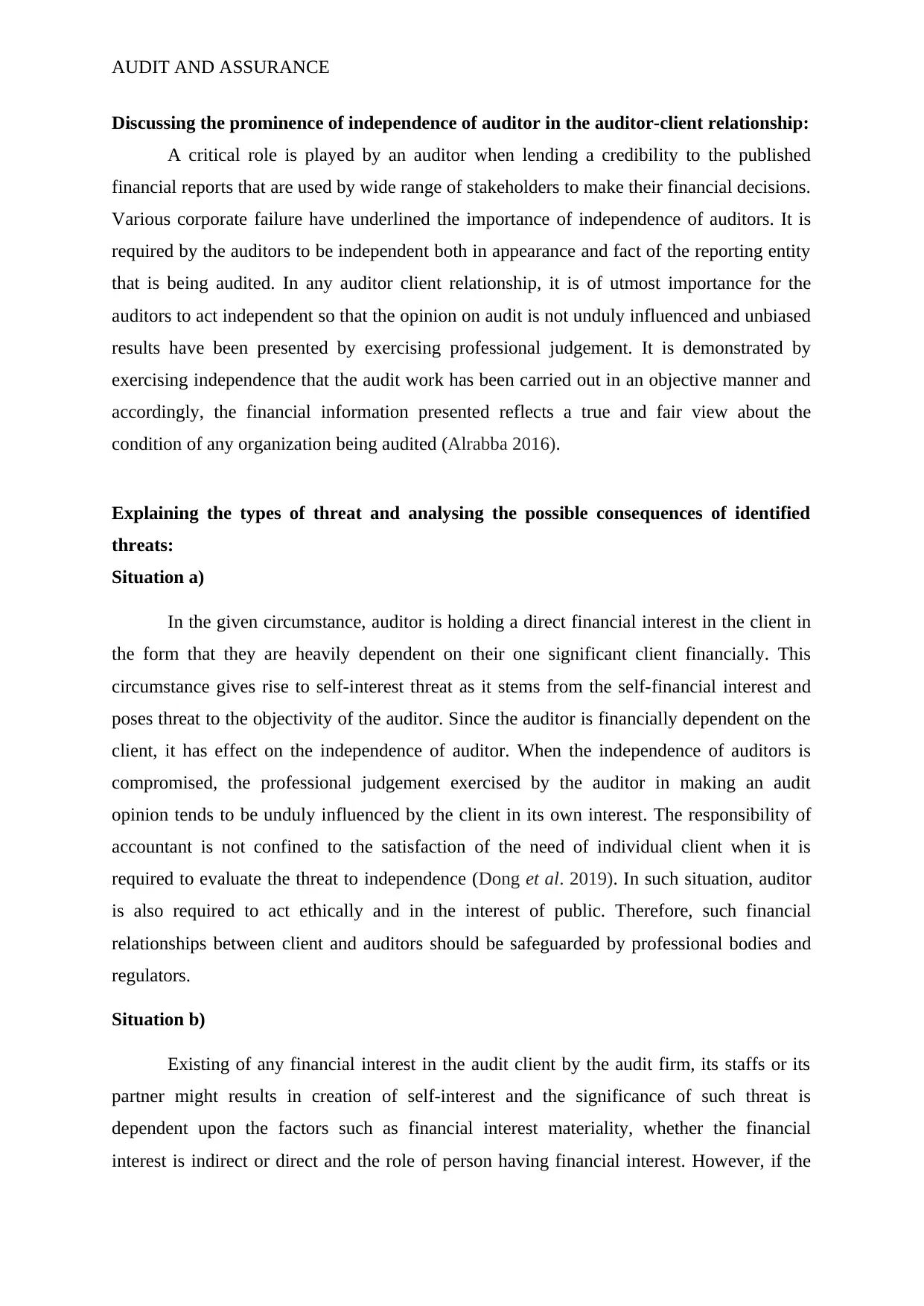
AUDIT AND ASSURANCE
Discussing the prominence of independence of auditor in the auditor-client relationship:
A critical role is played by an auditor when lending a credibility to the published
financial reports that are used by wide range of stakeholders to make their financial decisions.
Various corporate failure have underlined the importance of independence of auditors. It is
required by the auditors to be independent both in appearance and fact of the reporting entity
that is being audited. In any auditor client relationship, it is of utmost importance for the
auditors to act independent so that the opinion on audit is not unduly influenced and unbiased
results have been presented by exercising professional judgement. It is demonstrated by
exercising independence that the audit work has been carried out in an objective manner and
accordingly, the financial information presented reflects a true and fair view about the
condition of any organization being audited (Alrabba 2016).
Explaining the types of threat and analysing the possible consequences of identified
threats:
Situation a)
In the given circumstance, auditor is holding a direct financial interest in the client in
the form that they are heavily dependent on their one significant client financially. This
circumstance gives rise to self-interest threat as it stems from the self-financial interest and
poses threat to the objectivity of the auditor. Since the auditor is financially dependent on the
client, it has effect on the independence of auditor. When the independence of auditors is
compromised, the professional judgement exercised by the auditor in making an audit
opinion tends to be unduly influenced by the client in its own interest. The responsibility of
accountant is not confined to the satisfaction of the need of individual client when it is
required to evaluate the threat to independence (Dong et al. 2019). In such situation, auditor
is also required to act ethically and in the interest of public. Therefore, such financial
relationships between client and auditors should be safeguarded by professional bodies and
regulators.
Situation b)
Existing of any financial interest in the audit client by the audit firm, its staffs or its
partner might results in creation of self-interest and the significance of such threat is
dependent upon the factors such as financial interest materiality, whether the financial
interest is indirect or direct and the role of person having financial interest. However, if the
Discussing the prominence of independence of auditor in the auditor-client relationship:
A critical role is played by an auditor when lending a credibility to the published
financial reports that are used by wide range of stakeholders to make their financial decisions.
Various corporate failure have underlined the importance of independence of auditors. It is
required by the auditors to be independent both in appearance and fact of the reporting entity
that is being audited. In any auditor client relationship, it is of utmost importance for the
auditors to act independent so that the opinion on audit is not unduly influenced and unbiased
results have been presented by exercising professional judgement. It is demonstrated by
exercising independence that the audit work has been carried out in an objective manner and
accordingly, the financial information presented reflects a true and fair view about the
condition of any organization being audited (Alrabba 2016).
Explaining the types of threat and analysing the possible consequences of identified
threats:
Situation a)
In the given circumstance, auditor is holding a direct financial interest in the client in
the form that they are heavily dependent on their one significant client financially. This
circumstance gives rise to self-interest threat as it stems from the self-financial interest and
poses threat to the objectivity of the auditor. Since the auditor is financially dependent on the
client, it has effect on the independence of auditor. When the independence of auditors is
compromised, the professional judgement exercised by the auditor in making an audit
opinion tends to be unduly influenced by the client in its own interest. The responsibility of
accountant is not confined to the satisfaction of the need of individual client when it is
required to evaluate the threat to independence (Dong et al. 2019). In such situation, auditor
is also required to act ethically and in the interest of public. Therefore, such financial
relationships between client and auditors should be safeguarded by professional bodies and
regulators.
Situation b)
Existing of any financial interest in the audit client by the audit firm, its staffs or its
partner might results in creation of self-interest and the significance of such threat is
dependent upon the factors such as financial interest materiality, whether the financial
interest is indirect or direct and the role of person having financial interest. However, if the
Paraphrase This Document
Need a fresh take? Get an instant paraphrase of this document with our AI Paraphraser
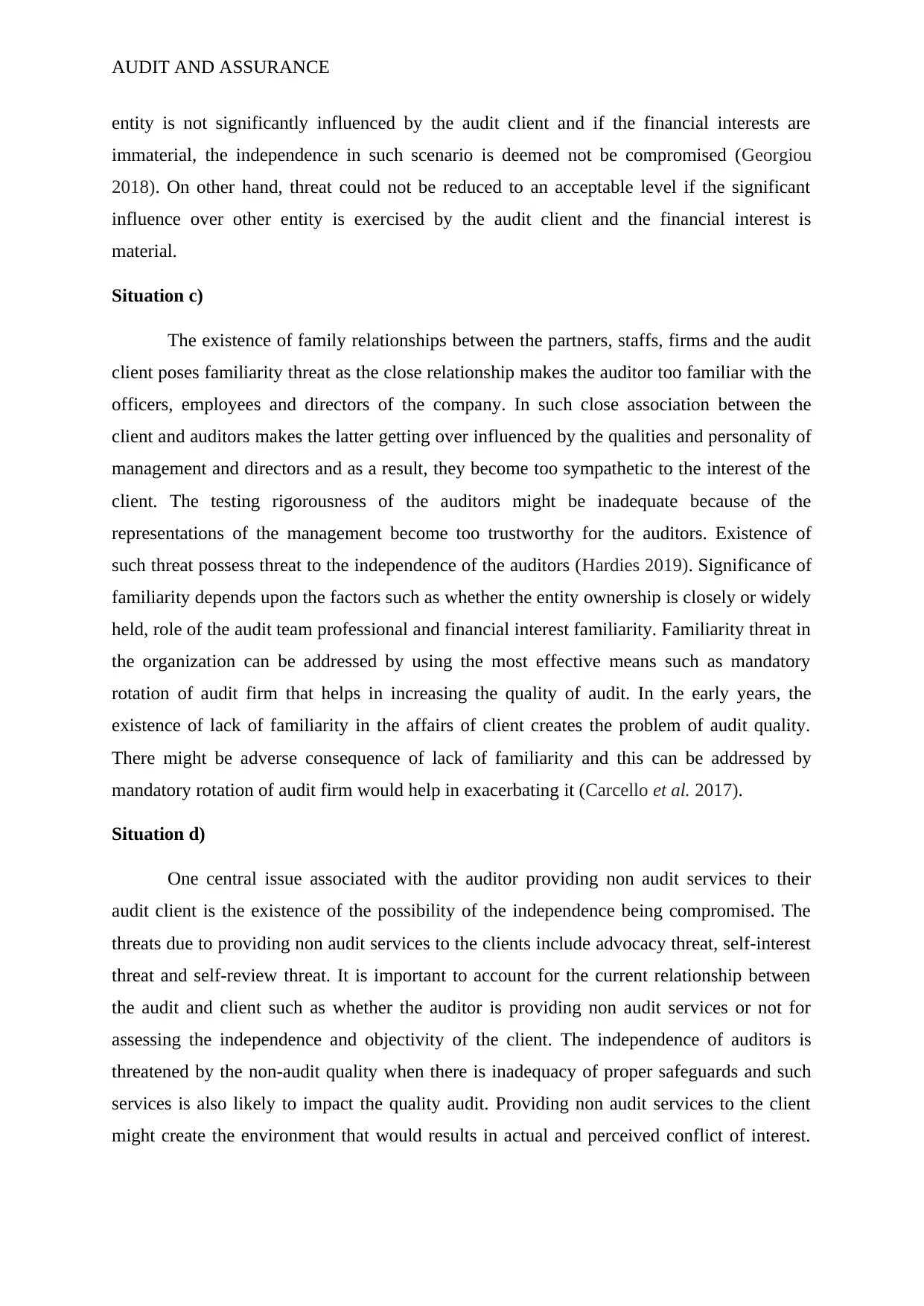
AUDIT AND ASSURANCE
entity is not significantly influenced by the audit client and if the financial interests are
immaterial, the independence in such scenario is deemed not be compromised (Georgiou
2018). On other hand, threat could not be reduced to an acceptable level if the significant
influence over other entity is exercised by the audit client and the financial interest is
material.
Situation c)
The existence of family relationships between the partners, staffs, firms and the audit
client poses familiarity threat as the close relationship makes the auditor too familiar with the
officers, employees and directors of the company. In such close association between the
client and auditors makes the latter getting over influenced by the qualities and personality of
management and directors and as a result, they become too sympathetic to the interest of the
client. The testing rigorousness of the auditors might be inadequate because of the
representations of the management become too trustworthy for the auditors. Existence of
such threat possess threat to the independence of the auditors (Hardies 2019). Significance of
familiarity depends upon the factors such as whether the entity ownership is closely or widely
held, role of the audit team professional and financial interest familiarity. Familiarity threat in
the organization can be addressed by using the most effective means such as mandatory
rotation of audit firm that helps in increasing the quality of audit. In the early years, the
existence of lack of familiarity in the affairs of client creates the problem of audit quality.
There might be adverse consequence of lack of familiarity and this can be addressed by
mandatory rotation of audit firm would help in exacerbating it (Carcello et al. 2017).
Situation d)
One central issue associated with the auditor providing non audit services to their
audit client is the existence of the possibility of the independence being compromised. The
threats due to providing non audit services to the clients include advocacy threat, self-interest
threat and self-review threat. It is important to account for the current relationship between
the audit and client such as whether the auditor is providing non audit services or not for
assessing the independence and objectivity of the client. The independence of auditors is
threatened by the non-audit quality when there is inadequacy of proper safeguards and such
services is also likely to impact the quality audit. Providing non audit services to the client
might create the environment that would results in actual and perceived conflict of interest.
entity is not significantly influenced by the audit client and if the financial interests are
immaterial, the independence in such scenario is deemed not be compromised (Georgiou
2018). On other hand, threat could not be reduced to an acceptable level if the significant
influence over other entity is exercised by the audit client and the financial interest is
material.
Situation c)
The existence of family relationships between the partners, staffs, firms and the audit
client poses familiarity threat as the close relationship makes the auditor too familiar with the
officers, employees and directors of the company. In such close association between the
client and auditors makes the latter getting over influenced by the qualities and personality of
management and directors and as a result, they become too sympathetic to the interest of the
client. The testing rigorousness of the auditors might be inadequate because of the
representations of the management become too trustworthy for the auditors. Existence of
such threat possess threat to the independence of the auditors (Hardies 2019). Significance of
familiarity depends upon the factors such as whether the entity ownership is closely or widely
held, role of the audit team professional and financial interest familiarity. Familiarity threat in
the organization can be addressed by using the most effective means such as mandatory
rotation of audit firm that helps in increasing the quality of audit. In the early years, the
existence of lack of familiarity in the affairs of client creates the problem of audit quality.
There might be adverse consequence of lack of familiarity and this can be addressed by
mandatory rotation of audit firm would help in exacerbating it (Carcello et al. 2017).
Situation d)
One central issue associated with the auditor providing non audit services to their
audit client is the existence of the possibility of the independence being compromised. The
threats due to providing non audit services to the clients include advocacy threat, self-interest
threat and self-review threat. It is important to account for the current relationship between
the audit and client such as whether the auditor is providing non audit services or not for
assessing the independence and objectivity of the client. The independence of auditors is
threatened by the non-audit quality when there is inadequacy of proper safeguards and such
services is also likely to impact the quality audit. Providing non audit services to the client
might create the environment that would results in actual and perceived conflict of interest.
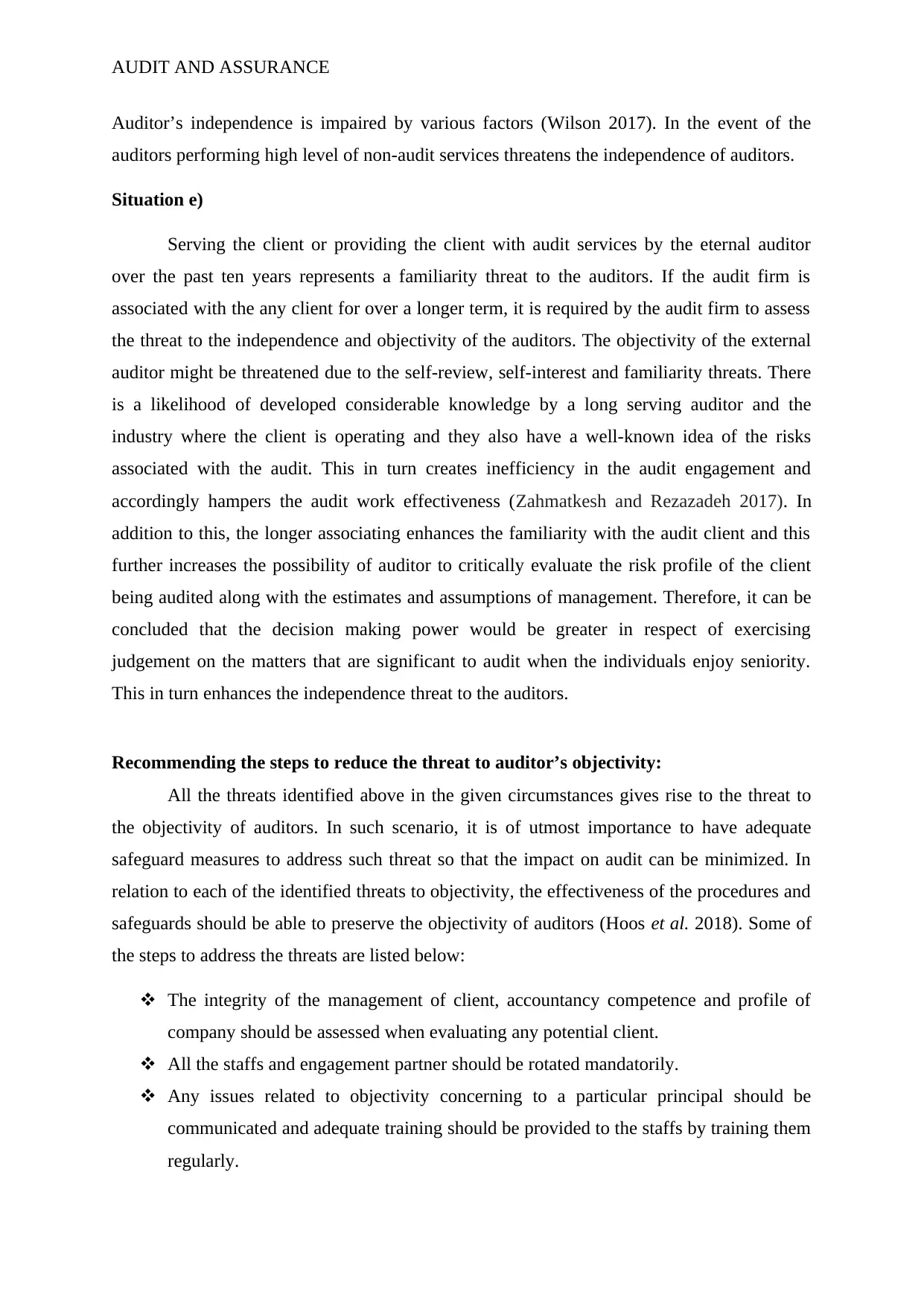
AUDIT AND ASSURANCE
Auditor’s independence is impaired by various factors (Wilson 2017). In the event of the
auditors performing high level of non-audit services threatens the independence of auditors.
Situation e)
Serving the client or providing the client with audit services by the eternal auditor
over the past ten years represents a familiarity threat to the auditors. If the audit firm is
associated with the any client for over a longer term, it is required by the audit firm to assess
the threat to the independence and objectivity of the auditors. The objectivity of the external
auditor might be threatened due to the self-review, self-interest and familiarity threats. There
is a likelihood of developed considerable knowledge by a long serving auditor and the
industry where the client is operating and they also have a well-known idea of the risks
associated with the audit. This in turn creates inefficiency in the audit engagement and
accordingly hampers the audit work effectiveness (Zahmatkesh and Rezazadeh 2017). In
addition to this, the longer associating enhances the familiarity with the audit client and this
further increases the possibility of auditor to critically evaluate the risk profile of the client
being audited along with the estimates and assumptions of management. Therefore, it can be
concluded that the decision making power would be greater in respect of exercising
judgement on the matters that are significant to audit when the individuals enjoy seniority.
This in turn enhances the independence threat to the auditors.
Recommending the steps to reduce the threat to auditor’s objectivity:
All the threats identified above in the given circumstances gives rise to the threat to
the objectivity of auditors. In such scenario, it is of utmost importance to have adequate
safeguard measures to address such threat so that the impact on audit can be minimized. In
relation to each of the identified threats to objectivity, the effectiveness of the procedures and
safeguards should be able to preserve the objectivity of auditors (Hoos et al. 2018). Some of
the steps to address the threats are listed below:
The integrity of the management of client, accountancy competence and profile of
company should be assessed when evaluating any potential client.
All the staffs and engagement partner should be rotated mandatorily.
Any issues related to objectivity concerning to a particular principal should be
communicated and adequate training should be provided to the staffs by training them
regularly.
Auditor’s independence is impaired by various factors (Wilson 2017). In the event of the
auditors performing high level of non-audit services threatens the independence of auditors.
Situation e)
Serving the client or providing the client with audit services by the eternal auditor
over the past ten years represents a familiarity threat to the auditors. If the audit firm is
associated with the any client for over a longer term, it is required by the audit firm to assess
the threat to the independence and objectivity of the auditors. The objectivity of the external
auditor might be threatened due to the self-review, self-interest and familiarity threats. There
is a likelihood of developed considerable knowledge by a long serving auditor and the
industry where the client is operating and they also have a well-known idea of the risks
associated with the audit. This in turn creates inefficiency in the audit engagement and
accordingly hampers the audit work effectiveness (Zahmatkesh and Rezazadeh 2017). In
addition to this, the longer associating enhances the familiarity with the audit client and this
further increases the possibility of auditor to critically evaluate the risk profile of the client
being audited along with the estimates and assumptions of management. Therefore, it can be
concluded that the decision making power would be greater in respect of exercising
judgement on the matters that are significant to audit when the individuals enjoy seniority.
This in turn enhances the independence threat to the auditors.
Recommending the steps to reduce the threat to auditor’s objectivity:
All the threats identified above in the given circumstances gives rise to the threat to
the objectivity of auditors. In such scenario, it is of utmost importance to have adequate
safeguard measures to address such threat so that the impact on audit can be minimized. In
relation to each of the identified threats to objectivity, the effectiveness of the procedures and
safeguards should be able to preserve the objectivity of auditors (Hoos et al. 2018). Some of
the steps to address the threats are listed below:
The integrity of the management of client, accountancy competence and profile of
company should be assessed when evaluating any potential client.
All the staffs and engagement partner should be rotated mandatorily.
Any issues related to objectivity concerning to a particular principal should be
communicated and adequate training should be provided to the staffs by training them
regularly.
⊘ This is a preview!⊘
Do you want full access?
Subscribe today to unlock all pages.

Trusted by 1+ million students worldwide
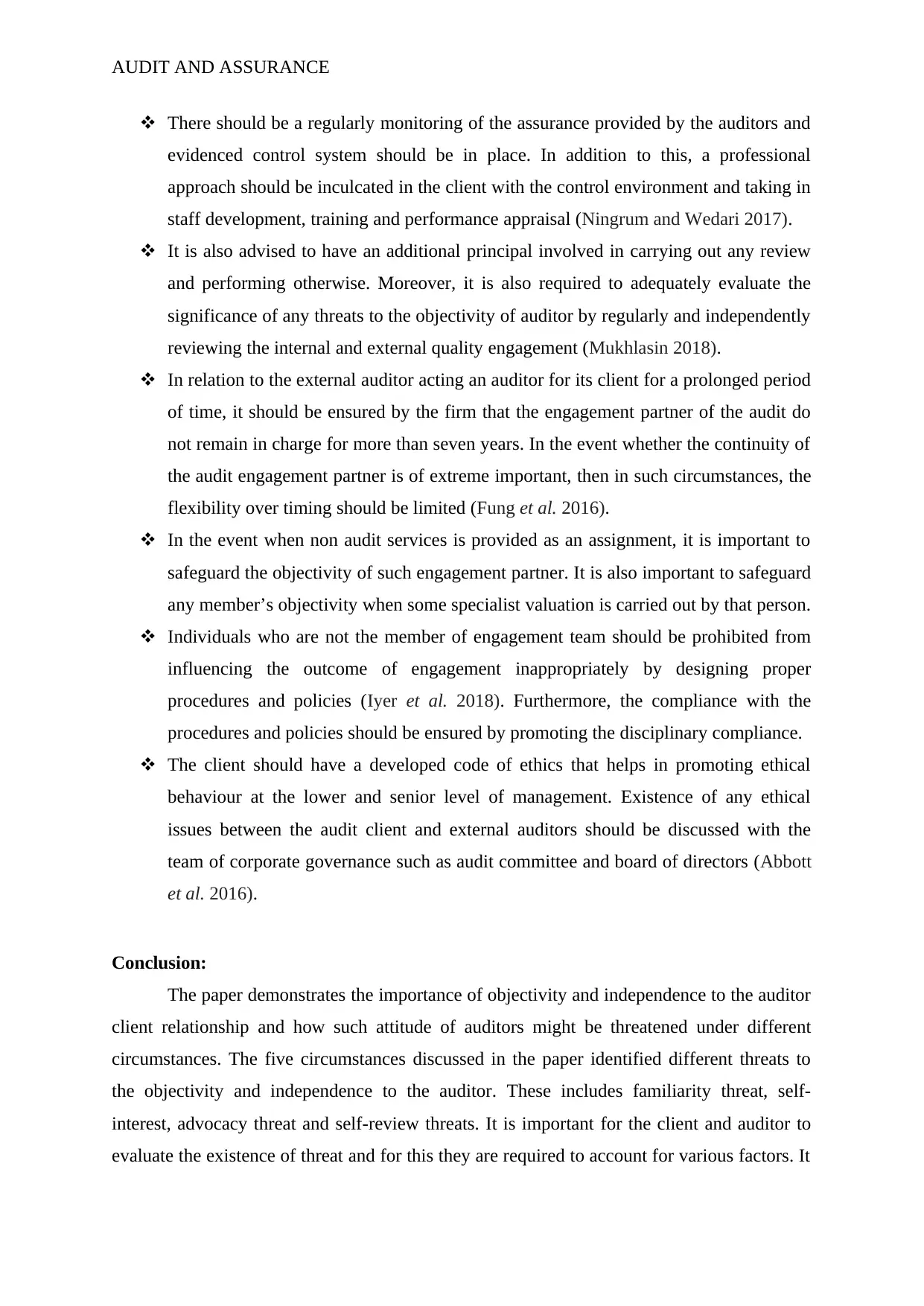
AUDIT AND ASSURANCE
There should be a regularly monitoring of the assurance provided by the auditors and
evidenced control system should be in place. In addition to this, a professional
approach should be inculcated in the client with the control environment and taking in
staff development, training and performance appraisal (Ningrum and Wedari 2017).
It is also advised to have an additional principal involved in carrying out any review
and performing otherwise. Moreover, it is also required to adequately evaluate the
significance of any threats to the objectivity of auditor by regularly and independently
reviewing the internal and external quality engagement (Mukhlasin 2018).
In relation to the external auditor acting an auditor for its client for a prolonged period
of time, it should be ensured by the firm that the engagement partner of the audit do
not remain in charge for more than seven years. In the event whether the continuity of
the audit engagement partner is of extreme important, then in such circumstances, the
flexibility over timing should be limited (Fung et al. 2016).
In the event when non audit services is provided as an assignment, it is important to
safeguard the objectivity of such engagement partner. It is also important to safeguard
any member’s objectivity when some specialist valuation is carried out by that person.
Individuals who are not the member of engagement team should be prohibited from
influencing the outcome of engagement inappropriately by designing proper
procedures and policies (Iyer et al. 2018). Furthermore, the compliance with the
procedures and policies should be ensured by promoting the disciplinary compliance.
The client should have a developed code of ethics that helps in promoting ethical
behaviour at the lower and senior level of management. Existence of any ethical
issues between the audit client and external auditors should be discussed with the
team of corporate governance such as audit committee and board of directors (Abbott
et al. 2016).
Conclusion:
The paper demonstrates the importance of objectivity and independence to the auditor
client relationship and how such attitude of auditors might be threatened under different
circumstances. The five circumstances discussed in the paper identified different threats to
the objectivity and independence to the auditor. These includes familiarity threat, self-
interest, advocacy threat and self-review threats. It is important for the client and auditor to
evaluate the existence of threat and for this they are required to account for various factors. It
There should be a regularly monitoring of the assurance provided by the auditors and
evidenced control system should be in place. In addition to this, a professional
approach should be inculcated in the client with the control environment and taking in
staff development, training and performance appraisal (Ningrum and Wedari 2017).
It is also advised to have an additional principal involved in carrying out any review
and performing otherwise. Moreover, it is also required to adequately evaluate the
significance of any threats to the objectivity of auditor by regularly and independently
reviewing the internal and external quality engagement (Mukhlasin 2018).
In relation to the external auditor acting an auditor for its client for a prolonged period
of time, it should be ensured by the firm that the engagement partner of the audit do
not remain in charge for more than seven years. In the event whether the continuity of
the audit engagement partner is of extreme important, then in such circumstances, the
flexibility over timing should be limited (Fung et al. 2016).
In the event when non audit services is provided as an assignment, it is important to
safeguard the objectivity of such engagement partner. It is also important to safeguard
any member’s objectivity when some specialist valuation is carried out by that person.
Individuals who are not the member of engagement team should be prohibited from
influencing the outcome of engagement inappropriately by designing proper
procedures and policies (Iyer et al. 2018). Furthermore, the compliance with the
procedures and policies should be ensured by promoting the disciplinary compliance.
The client should have a developed code of ethics that helps in promoting ethical
behaviour at the lower and senior level of management. Existence of any ethical
issues between the audit client and external auditors should be discussed with the
team of corporate governance such as audit committee and board of directors (Abbott
et al. 2016).
Conclusion:
The paper demonstrates the importance of objectivity and independence to the auditor
client relationship and how such attitude of auditors might be threatened under different
circumstances. The five circumstances discussed in the paper identified different threats to
the objectivity and independence to the auditor. These includes familiarity threat, self-
interest, advocacy threat and self-review threats. It is important for the client and auditor to
evaluate the existence of threat and for this they are required to account for various factors. It
Paraphrase This Document
Need a fresh take? Get an instant paraphrase of this document with our AI Paraphraser
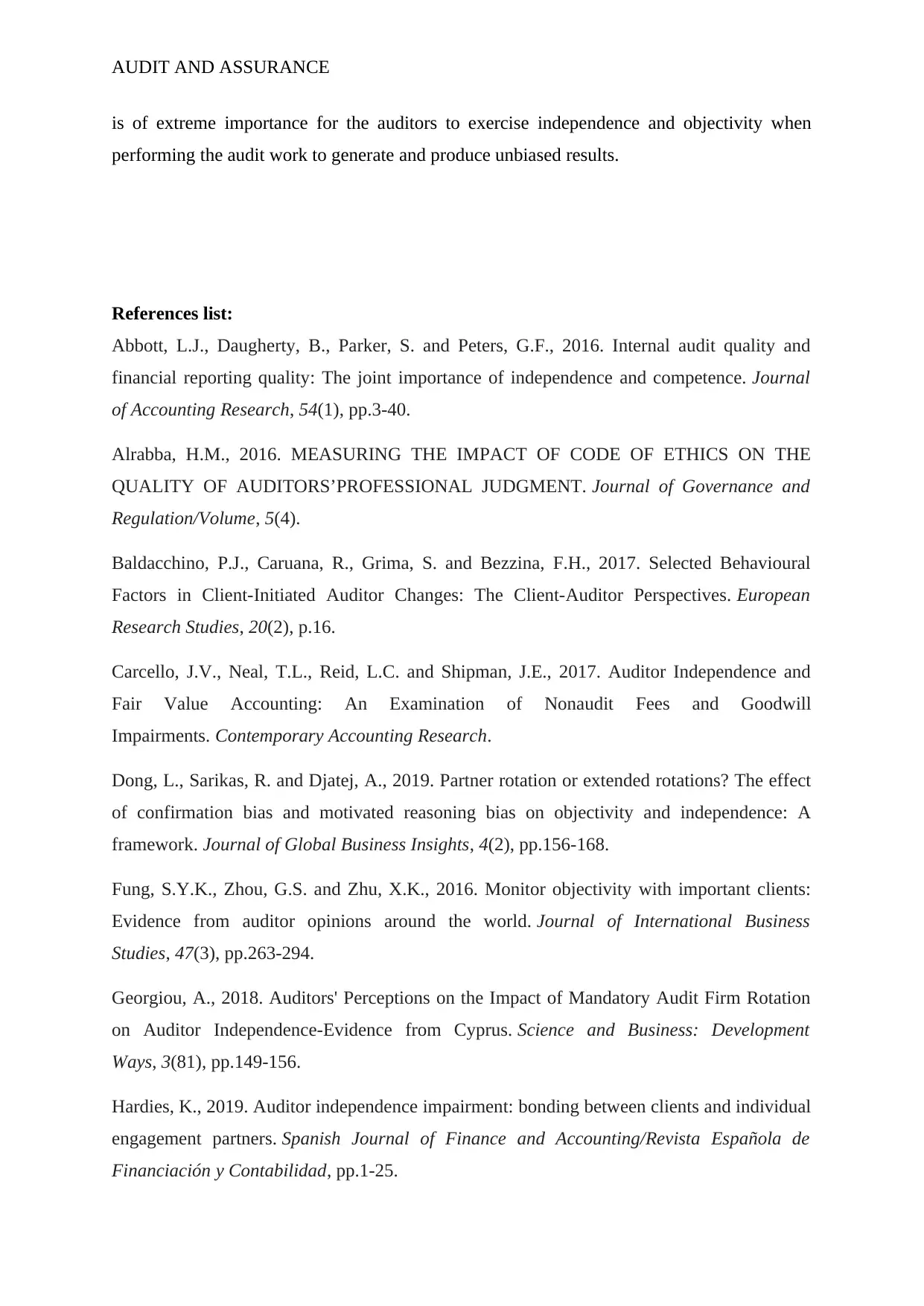
AUDIT AND ASSURANCE
is of extreme importance for the auditors to exercise independence and objectivity when
performing the audit work to generate and produce unbiased results.
References list:
Abbott, L.J., Daugherty, B., Parker, S. and Peters, G.F., 2016. Internal audit quality and
financial reporting quality: The joint importance of independence and competence. Journal
of Accounting Research, 54(1), pp.3-40.
Alrabba, H.M., 2016. MEASURING THE IMPACT OF CODE OF ETHICS ON THE
QUALITY OF AUDITORS’PROFESSIONAL JUDGMENT. Journal of Governance and
Regulation/Volume, 5(4).
Baldacchino, P.J., Caruana, R., Grima, S. and Bezzina, F.H., 2017. Selected Behavioural
Factors in Client-Initiated Auditor Changes: The Client-Auditor Perspectives. European
Research Studies, 20(2), p.16.
Carcello, J.V., Neal, T.L., Reid, L.C. and Shipman, J.E., 2017. Auditor Independence and
Fair Value Accounting: An Examination of Nonaudit Fees and Goodwill
Impairments. Contemporary Accounting Research.
Dong, L., Sarikas, R. and Djatej, A., 2019. Partner rotation or extended rotations? The effect
of confirmation bias and motivated reasoning bias on objectivity and independence: A
framework. Journal of Global Business Insights, 4(2), pp.156-168.
Fung, S.Y.K., Zhou, G.S. and Zhu, X.K., 2016. Monitor objectivity with important clients:
Evidence from auditor opinions around the world. Journal of International Business
Studies, 47(3), pp.263-294.
Georgiou, A., 2018. Auditors' Perceptions on the Impact of Mandatory Audit Firm Rotation
on Auditor Independence-Evidence from Cyprus. Science and Business: Development
Ways, 3(81), pp.149-156.
Hardies, K., 2019. Auditor independence impairment: bonding between clients and individual
engagement partners. Spanish Journal of Finance and Accounting/Revista Española de
Financiación y Contabilidad, pp.1-25.
is of extreme importance for the auditors to exercise independence and objectivity when
performing the audit work to generate and produce unbiased results.
References list:
Abbott, L.J., Daugherty, B., Parker, S. and Peters, G.F., 2016. Internal audit quality and
financial reporting quality: The joint importance of independence and competence. Journal
of Accounting Research, 54(1), pp.3-40.
Alrabba, H.M., 2016. MEASURING THE IMPACT OF CODE OF ETHICS ON THE
QUALITY OF AUDITORS’PROFESSIONAL JUDGMENT. Journal of Governance and
Regulation/Volume, 5(4).
Baldacchino, P.J., Caruana, R., Grima, S. and Bezzina, F.H., 2017. Selected Behavioural
Factors in Client-Initiated Auditor Changes: The Client-Auditor Perspectives. European
Research Studies, 20(2), p.16.
Carcello, J.V., Neal, T.L., Reid, L.C. and Shipman, J.E., 2017. Auditor Independence and
Fair Value Accounting: An Examination of Nonaudit Fees and Goodwill
Impairments. Contemporary Accounting Research.
Dong, L., Sarikas, R. and Djatej, A., 2019. Partner rotation or extended rotations? The effect
of confirmation bias and motivated reasoning bias on objectivity and independence: A
framework. Journal of Global Business Insights, 4(2), pp.156-168.
Fung, S.Y.K., Zhou, G.S. and Zhu, X.K., 2016. Monitor objectivity with important clients:
Evidence from auditor opinions around the world. Journal of International Business
Studies, 47(3), pp.263-294.
Georgiou, A., 2018. Auditors' Perceptions on the Impact of Mandatory Audit Firm Rotation
on Auditor Independence-Evidence from Cyprus. Science and Business: Development
Ways, 3(81), pp.149-156.
Hardies, K., 2019. Auditor independence impairment: bonding between clients and individual
engagement partners. Spanish Journal of Finance and Accounting/Revista Española de
Financiación y Contabilidad, pp.1-25.

AUDIT AND ASSURANCE
Hoos, F., Messier Jr, W.F., Smith, J.L. and Tandy, P.R., 2018. An experimental investigation
of the interaction effect of management training ground and reporting lines on internal
auditors’ objectivity. International Journal of Auditing, 22(2), pp.150-163.
Iyer, V.M., Jones III, A. and Raghunandan, K., 2018. Factors related to internal auditors'
organizational-professional conflict. Accounting Horizons, 32(4), pp.133-146.
Mohammadi, S. and Shirzad, A., 2016. Risk Management: Evidence from the Role of
Auditors. Journal of Multidisciplinary Scientific Research, 4(1), pp.18-21.
Mukhlasin, M., 2018. Auditor Tenure and Auditor Industry Specialization as a Signal to
Detect Fraudulent Financial Reporting. Academy of Accounting and Financial Studies
Journal.
Ningrum, G.S. and Wedari, L.K., 2017. Impact Of Auditor’s Work Experience,
Independence, Objectivity, Integrity, Competency And Accountibility On Audit
Quality. Journal Economics & Business Atmajaya Indonesia, 1(1), pp.19-33.
Shah, M.K., 2017. The Impact of Various Responsibilities of the Auditors in Context of
Independence and Impartiality: A Perception of Accounting Professionals. Journal of
Commerce and Accounting Research, 6(4), p.10.
Wilson, R., 2017. The impact of revolving door practice and policy on nonprofessional
investors’ perceptions of auditor independence. Accounting and Business Research, 47(7),
pp.752-779.
Zahmatkesh, S. and Rezazadeh, J., 2017. The effect of auditor features on audit
quality. Tékhne, 15(2), pp.79-87.
Hoos, F., Messier Jr, W.F., Smith, J.L. and Tandy, P.R., 2018. An experimental investigation
of the interaction effect of management training ground and reporting lines on internal
auditors’ objectivity. International Journal of Auditing, 22(2), pp.150-163.
Iyer, V.M., Jones III, A. and Raghunandan, K., 2018. Factors related to internal auditors'
organizational-professional conflict. Accounting Horizons, 32(4), pp.133-146.
Mohammadi, S. and Shirzad, A., 2016. Risk Management: Evidence from the Role of
Auditors. Journal of Multidisciplinary Scientific Research, 4(1), pp.18-21.
Mukhlasin, M., 2018. Auditor Tenure and Auditor Industry Specialization as a Signal to
Detect Fraudulent Financial Reporting. Academy of Accounting and Financial Studies
Journal.
Ningrum, G.S. and Wedari, L.K., 2017. Impact Of Auditor’s Work Experience,
Independence, Objectivity, Integrity, Competency And Accountibility On Audit
Quality. Journal Economics & Business Atmajaya Indonesia, 1(1), pp.19-33.
Shah, M.K., 2017. The Impact of Various Responsibilities of the Auditors in Context of
Independence and Impartiality: A Perception of Accounting Professionals. Journal of
Commerce and Accounting Research, 6(4), p.10.
Wilson, R., 2017. The impact of revolving door practice and policy on nonprofessional
investors’ perceptions of auditor independence. Accounting and Business Research, 47(7),
pp.752-779.
Zahmatkesh, S. and Rezazadeh, J., 2017. The effect of auditor features on audit
quality. Tékhne, 15(2), pp.79-87.
⊘ This is a preview!⊘
Do you want full access?
Subscribe today to unlock all pages.

Trusted by 1+ million students worldwide
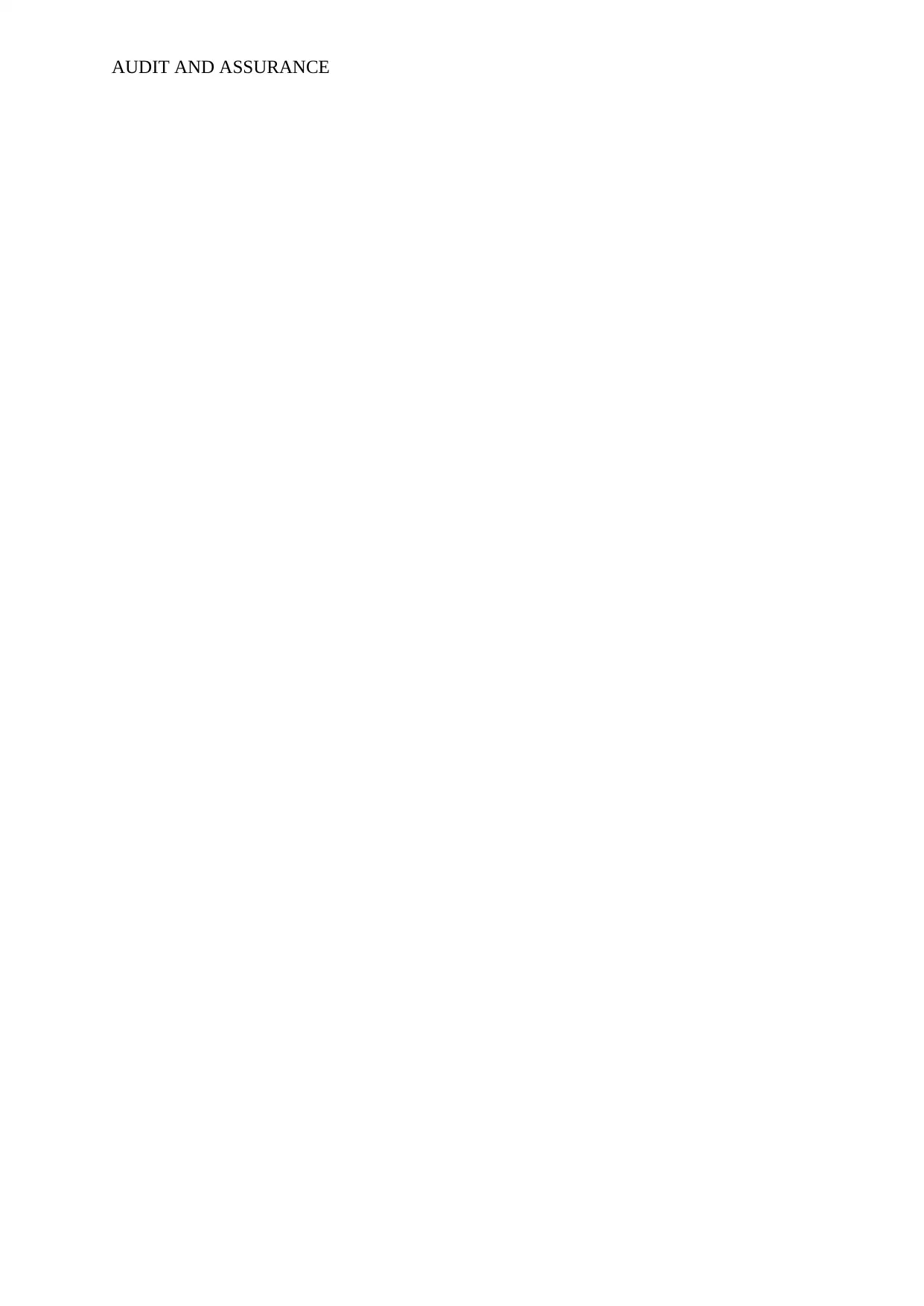
AUDIT AND ASSURANCE
1 out of 10
Related Documents
Your All-in-One AI-Powered Toolkit for Academic Success.
+13062052269
info@desklib.com
Available 24*7 on WhatsApp / Email
![[object Object]](/_next/static/media/star-bottom.7253800d.svg)
Unlock your academic potential
Copyright © 2020–2026 A2Z Services. All Rights Reserved. Developed and managed by ZUCOL.




